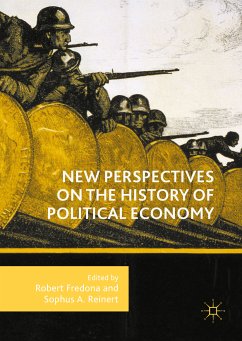The first decade of the twenty-first century, bookended by 9/11 and a global financial crisis, witnessed the clamorous and urgent return of both 'the political' and 'the economic' to historiographical debates. It is becoming more important than ever to rethink the historical role of politics (and, indeed, of government) in business, economic production, distribution, and exchange. The artefacts of pre-modern and modern political economy, from the fourteenth through the twentieth centuries, remain monuments of perennial importance for understanding how human beings grappled with and overcame material hardship, organized their political and economic communities, won great wealth and lost it, conquered and were conquered.
The present volume, assembling some of the brightest lights in the field, eloquently testifies to the rich and powerful lessons to be had from such a historical understandingof political economy and of power in an economic age.
Dieser Download kann aus rechtlichen Gründen nur mit Rechnungsadresse in A, B, BG, CY, CZ, D, DK, EW, E, FIN, F, GR, HR, H, IRL, I, LT, L, LR, M, NL, PL, P, R, S, SLO, SK ausgeliefert werden.









